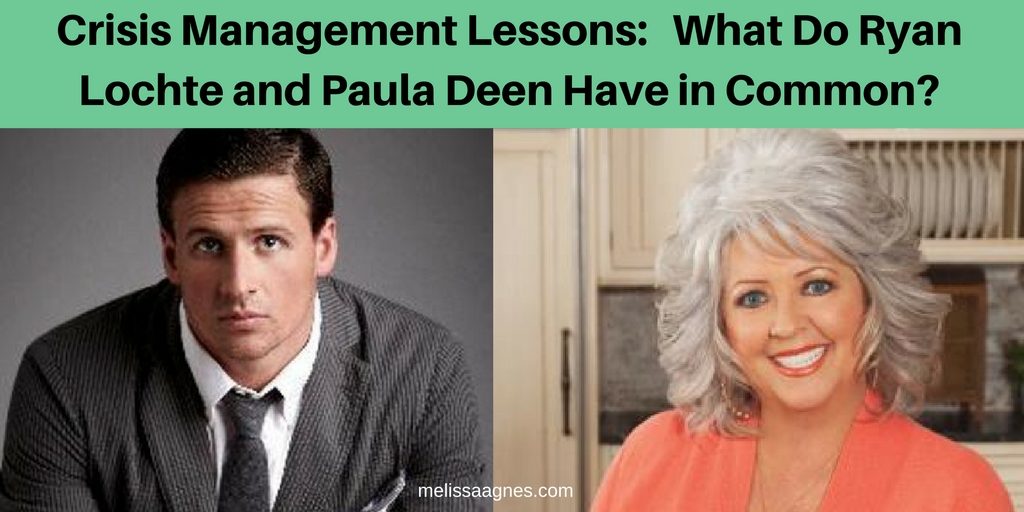 What do Ryan Lochte and Paula Deen and have in common?
What do Ryan Lochte and Paula Deen and have in common?
They are both personal brands who have suffered negative material impact due to poor judgment and unethical (public) behavior.
As professionals, we’re all personal brands. We represent ourselves in the professional world just as much as we represent the organization for which we work or the sponsors or partners that we represent. As a result, bad, immoral or unethical decisions can send it all crumbling down, dreams seemingly destroyed, in what will seem like a blink of an eye.
This is the fate that Lochte is now experiencing, after three sponsors (at the time that I was writing this article) have now dropped him.
Important crisis management lessons to learn (and implement)
Crisis management lesson for the professional:
Think before each action. Drunk, sober or otherwise, there is no excuse for poor judgment (or a sorry excuse at an apology – another thing that Lochte and Deen have in common) and one inexcusable or controversial act can be your downfall. No matter how “big” you think you are – a national public figure or an Olympian – the court of public opinion is bigger and has a lot more weight.
This seems logical. As though it goes without saying. But apparently that’s not the case, so I’m taking the time to say it.
Crisis management lesson for the organization:
Build a brand that knows what it stands for and define your organization’s threshold for unacceptable behavior or personal misconduct that can result in damaging repercussions, and then embed this mindset into the very culture of your organization, ensuring that it is widely and irrefutably known internally. Having these lines drawn now will go a long way in both your crisis management and crisis prevention. For example:
Personal misconduct can be one of the messiest types of crises to manage. It can be messy and lead to poor judgment and actions when the misconduct comes from a prominent member of the team that leadership has a close or personal relationship with, just as it can be messy and result in poor judgement when the act is committed by a lower level employee that senior management doesn’t necessarily know very well, and when management is worried that the act may have damaging consequences on the brand. This is a crisis scenario that involves emotion, one way or the other. And when emotion becomes involved, things get messy.
Jumping to the wrong conclusion and taking too harsh a position against the employee can be just as damaging as not taking a harsh enough position. Having this conversation with the rest of your leadership team now, while calm, cool and collected, can go a long way in making sure everybody is aligned on the types of conditions, behaviors and circumstances that would call for some sort of response by the organization, one way or the other.
“Personal misconduct” is a high-risk scenario that I often help organizations think through and plan for as part of helping them implement a crisis-ready culture. Has it been added to your crisis preparedness to-do list? If it hasn’t, it may be worthwhile to have this discussion internally.
Image credits: twitter.com/ryanlochte and http://www.foodnetwork.com/chefs/paula-deen.html

Author of Crisis Ready: Building an Invincible Brand in an Uncertain World, Melissa Agnes is a leading authority on crisis preparedness, reputation management, and brand protection. Agnes is a coveted keynote speaker, commentator, and advisor to some of today’s leading organizations faced with the greatest risks. Learn more about Melissa and her work here.
